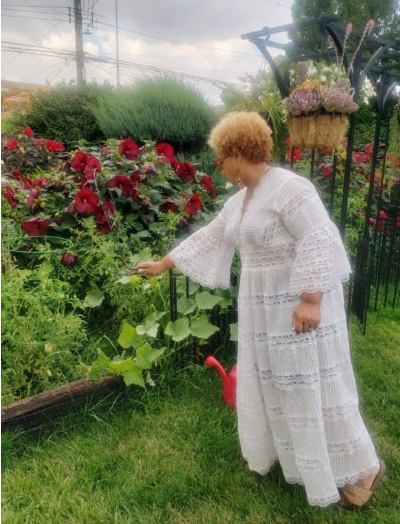
I live in a second-generation home. This home used to belong to my maternal grandmother, Leontine Lemon. My grandmother worked for the Chicago Housing Authority, but her love was gardening. She won many awards for her garden and has even been featured in the Chicago Defender. My grandmother would be in the garden every day, pruning, picking, and planning. When someone came over, you came to work and learn about gardening. I did not have to go to the store. I could get raspberries and tomatoes, eggplant okra, grapes, and cherries from the garden. It was somewhere special, and it was a safe place. Then I left Chicago when I was 17. I lived in the South for years. I was fascinated when I went down South because there were orange trees. I have never seen oranges on trees. That was where I first was introduced to hibiscus. The zone down there was so different from the area I grew up in. I planted everything down there.
Then I came back to Chatham in 2009 and brought what I was taught by my granny back to the grounds where she started it. My garden may not look like my granny’s, however, I feel her energy and a connection when I am tilling the land and turning over the soil. I think about my granny when I am growing collard greens, cucumbers, okra, brussel sprouts, corn, eggplant, I get gangsta with it and grow everything, even if I don’t eat it. I also grow flowers and have indoor plants! I do it all! It’s my safe space.
Everyone can start growing in their home. You can grow certain herbs and celery. Our ancestors used to grow many herbs for medicinal purposes. Let’s take it block by block, person by person. Every summer, my job is to figure out where I can start a new garden. I love volunteering in Black spaces that are food deserts. This allows me not only to learn but to give. I keep it close to home, and I also assist my neighbors on my block with starting and maintaining their gardens. Growing our own food is revolutionary! Starting a community garden where Black people are disproportionately affected by food insecurities and teaching them how to grow food to feed themselves and their neighbors is revolutionary! So Let’s Grow!
The misconception also exists because we are less likely to have access to safe park spaces, community gardens, forest preserves, and hiking trails in urban neighborhoods due to redlining, white flight, and other factors. What’s more, Black people are underrepresented in ownership of green spaces such as nurseries and plant shops. Nika Vaughn (Instagram-@plantsalonchicago) owner of Plant Salon (West Town, Chicago) which specializes in indoor plants, tropical plants, and aroids briefly speaks about how her love for plants started, what plant ownership means for Black people during these times, and seemingly being the only Black-owned brick and mortar plant shop in the city.


